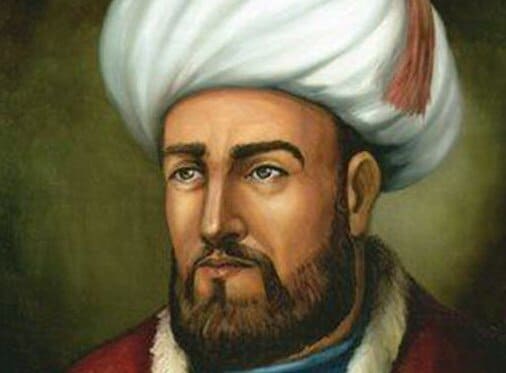The Persian religious thinker Abu Hamid al-Ghazali is one of the most widely read Islamic authors. In the West he is traditionally held responsible for abolishing philosophy from Islam in the 11th century. In the meantime, his work is also seen in a more differentiated way.
“It has to be said that al-Ghazali wrote endless works. Several of these have become important at different times. Certainly his most influential is the Revival of Religious Studies, a book that is particularly important because it offers such a great synthesis between theology, mysticism and Islamic law.”
So Thomas Bauer from the University of Münster about Abu Hamid Al-Ghazali, who was born around the year 1057 in today’s Iran. Ghazali enjoyed a classical Islamic education. Around the age of 30, he himself came to Baghdad, the center of the already declining empire of the Abbasid dynasty, as a scholar. Ghazali initially gained a great reputation primarily for his work on Islamic law. At the same time, he worked his way thoroughly into the philosophical writings. Accompanied by the increasing political and religious disputes of his time, however, he plunged into a deep intellectual crisis:
After a long period of doubt, I have come to the point where I do not concede any certainty to sensual knowledge either,
… writes Ghazali in his autobiographical work: “The Liberator from Error”. Ghazali had developed skepticism about the widespread belief in authority, which calls for people to only agree with existing scholarly opinions, some time ago. Nor would he rely on reason alone to satisfy his need for certainty. He writes:
Perhaps another judge is hiding behind the knowledge of reason, who, as soon as he appears, accuses the judgment of reason of lying.
At some point it becomes too much for the scholar. Almost at the peak of his success, he gave up his prestigious position in Baghdad. Gave away all his possessions and went in search of love for God. As an ascetic, Ghazali followed the path of mysticism for almost eleven years. He then went back to his home region and accepted a chair at his former training center. During this time he also completed his famous work Ihya ulum al-din – The Revival of Religious Studies. It is perhaps the most important theological treatise in Islam.
If Islam is now sometimes attested to have a strained relationship to philosophy, Ghazali is not entirely innocent. The French writer and historian Ernest Renan described him in 1852 as an “enemy of philosophy”. And his German colleague and contemporary Salomon Munk came to the conclusion:
Ghazali struck a blow against philosophy from which it could not recover in the Orient.
One work in particular brought him the reputation of the destroyer: “The Incoherence of Philosophy”. In this book, Ghazali critically examined the thinking of the most important Islamic philosophers of the time, from a theological perspective: Ibn Sina and Al-Farabi, known in Europe as Avicenna and Alfarabius. Ghazali lists a total of 20 tenets of theirs that he believes have flaws and flaws – such as the claim that the world is uncreated and eternal. Or: only the soul, but not the body, will be resurrected. In some cases, Ghazali’s remarks had fatal consequences. He declared 17 of these tenets to be heretical, three even as a sign of apostasy, i.e. a defection from the faith, which according to classical legal opinion is punishable by death.
The Islamic scholar Frank Griffel from Yale University is currently one of the best experts on Ghazali:
Ghazali never condemned or rejected philosophy as a whole. On the contrary, he and others taught it and thus established the Aristotelian tradition in the Asharite Kalam (which is the dominant school of theology in Islam). The appropriation of philosophy by the Asharite Kalam was only made possible by Ghazali’s works.
That part of Islamic theology that we would call orthodox in our parlance has endeavored to reject reason and human influences on religion. He still does today. The literal conception of God in the Qur’an constitutes its essence. Currents such as philosophy or mysticism – which rely on human reason and emotional power – were foreign to them. Some orthodox believers even saw them as a threat. In Ghazali’s world of ideas, philosophy was also to be viewed critically, but only where it violated fundamental Islamic tenets: that is, in monotheism, in Muhammad’s prophethood and in the Koranic description of life after death. The Islamic scholar Thomas Bauer also states with reference to Ghazali:
“But he never turned his back on philosophy as a whole, as can be seen in his book on legal methodology – al-Mustasfa is a work in which he brought Aristotelian logic more strongly than anyone before him. Since then, the logic of legal methodology has become indispensable.”
Even if Ghazali did not want to accept human reason as the sole source of knowledge, he appreciated its value throughout his life. In the “Revival of Religious Studies” he writes about reason:
And it is as if she were a light that enters the heart, enabling it to understand things. And he is wrong who denies this and reduces reason to mere necessary knowledge.
Ghazali is convinced that when human reason shows itself in the form of arguments “that are evident and cannot be disputed,” then conclusions must be accepted. Then they could no more be considered false than divine revelation. If the two contradict each other, the Koran must be interpreted figuratively and read symbolically for a deeper truth.
Despite the basic recognition of almost all subsequent scholars, Ghazali was not without opponents. The Andalusian Ibn Ruschd, known in Europe as Averroes, wrote a book about a hundred years later, which in turn was intended to show the shortcomings and errors in Ghazali’s philosophy criticism. Even Ibn Rushd’s famous teacher Ibn Tufayl had turned against Ghazali. He even accused him of opportunism:
Ghazali is Asharite with the Asharites, Sufi with the Sufis, philosopher with the philosophers.
But Ibn Tufayl and Ibn Rushd did not succeed in maintaining the pure philosophical teachings in Islam against the criticism of Ghazali and against the political and social circumstances of their time.
On the other side of the theological spectrum, the anti-rationalist, critics of Ghazali also formed. One must certainly mention Ibn Taymiyya, one of the favorite authors of today’s fundamentalists. Already in the 13th century he preached the absolute return to the Koran and Sunna. Ibn Taymiyya especially did not want to agree to Ghazali’s demand that in the case of intellectual conflict a figurative meaning be preferred to a literal meaning of sacred texts.
According to Thomas Bauer from the University of Münster, Ghazali can still offer orientation to Muslims today – as long as you don’t take every sentence he says literally:
“Ghazali was a very strict, pious man. You have to see that classical Islam is an extremely pluralistic or pluralistic religion, and of course you will find a wide variety of opinions on the various topics. Ghazali is not as rigorous as Ibn Taymiyya or the like, but he is one of the more rigorous. And many of his statements are of course also to be read against the background of his time and cannot be transferred one-to-one to the present. But I think most Muslims know that very well.”
What was Al-Ghazali known for?
Al-Ghazali contributed significantly to the development of a systematic view of Sufism and its integration and acceptance in mainstream Islam. As a scholar of Sunni Islam, he belonged to the Shafi’i school of Islamic jurisprudence and to the Asharite school of theology.
What is the most important work of Al-Ghazali in Persian?
This is what al-Ghazali did, spending nearly two years in seclusion and wandering between Damascus, Jerusalem and Mecca. It was during this period that he began work on his most important book; Ihya’ ‘Ulum ad-Din [The Revival of the Religious Sciences], which he may have completed later.
What is education according to Al-Ghazali?
Al-Ghazali asserts that education as a process that must lead human beings towards the consciousness of the Creator in order to obey His commands. Muslims need a different model independent of the western influence, based on fundamental assumptions of Muslim about his life.
What did Imam Ghazali say about music?
Ghazali’s own position is that music in itself is permissible, though under certain circumstances it can be unlawful or undesirable. Ghazali emphasises awareness of the omnipresence of God in creation and the importance of using the mind, hearing and sight to bring one closer to God.
Is music allowed in Islam?
Imam al-Ghazzali, reported several hadith and came to the conclusion that music in and of itself is permitted, saying: “All these Ahadith are reported by al-Bukhari and singing and playing are not haram.” He also references a narration from Khidr, wherein a favorable opinion of music is expressed.
Is Piano Haram in Islam?
“Majority of ulama forbid the use of musical instruments except for those drummed like the kompang, percussions even those with bells,” he said.
Is Dancing haram?
While moderate Muslims generally don’t object to music and dancing per se, a large portion of the faithful view sexually suggestive movement, racy lyrics, and unmarried couples dancing together as haram, because they may lead to un-Islamic behavior.
Is Singing halal in Islam?
The Muslim scholar al-Qaradawi states that singing and music in itself is permissible and pleasurable. He places several restrictions on them though. The content of the song should not be against the morals and teachings of Islam or be accompanied by other forbidden things in Islam like alcohol.
Is it haram to play chess?
Saudi Arabia’s grand mufti has ruled that chess is forbidden in Islam, saying it encourages gambling and is a waste of time.
Can you date in Islam?
Dating is still linked to its Western origins, which implies underlying expectations of sexual interactions — if not an outright premarital sexual relationship — which Islamic texts prohibit. But Islam does not forbid love.
Are worms halal?
As for worms, there are different opinions. Some ulamas (interpreters of Islamic rules), such as Imam Malik, Ibn Abi Laila and al-Auza’i, declare that eating worms is Halal as long as it brings benefits and it is not harmful to human health. But there are also ulamas who say human consumption of worms is forbidden.
Is it haram to adopt a child?
Thus many Muslims say that it is forbidden by Islamic law to adopt a child (in the common sense of the word), but permissible to take care of another child, which is known in Arabic as الكفالة (kafala), and is translated literally as sponsorship.





